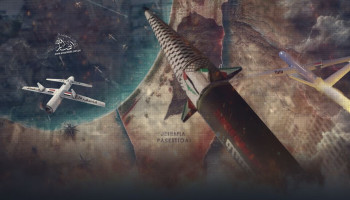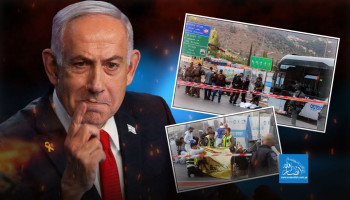Ansarollah Website Official Report
Published: Rabiʻ I 18, 1447 AH
Doha has witnessed a grave escalation as the Zionist military announced airstrikes targeting senior Hamas leaders and members of the negotiating delegation. The strikes represent an unprecedented level of political and military recklessness, carrying alarming messages that extend far beyond Qatar. This was not a mere assassination attempt but an explicit declaration that no nation is immune from the aggression of the Zionist entity. Many observers have described the event as a political and security precedent, raising serious questions about the boundaries of Israeli conduct and the implications of this operation in both regional and international contexts.
The aggression comes in the wake of repeated statements by Zionist officials, foremost among them the Chief of Staff of the occupation army, Eyal Zamir, who has openly declared the enemy’s intent to target Hamas leaders abroad. These declarations were reinforced by comments from U.S. envoy Tom Brack, who noted that “Israel” no longer recognizes the political borders drawn since the Sykes-Picot Agreement and acts whenever, wherever, and however it pleases. Such positions signal an erosion of the very concept of national sovereignty and place the strikes in Doha within a broader strategic framework: the Zionist entity considers itself entitled to reach any location, target any figure, and disregard sovereignty, alliances, or international law. This approach reflects Criminal Netanyahu’s rhetoric on reshaping the Middle East—an agenda centered on unrestricted Israeli action and legitimizing the targeting of opponents regardless of geography.
Although the Zionist entity executed the attack, many analysts argue that it unfolded under clear American cover. This opens a debate over the true nature of U.S.-Israeli relations, and more critically, over Washington’s relations with its other allies—especially Arab and Muslim states. The American role here goes beyond traditional "defense", extending to permitting strikes even in states allied with Washington itself. Thus, the crime carries a dual dimension: Israeli in execution, American in political and military sponsorship.
For Qatar—the mediator in negotiations—the attack represents a double humiliation. First, it was a direct assault on its territory and sovereignty, making it not just a military act but also a political message undermining its status as a mediator. Second, the strikes occurred under full American cover despite Doha’s close ties with Washington. The irony is stark: Qatar invested one trillion dollars in the Trump administration and even gifted a luxury aircraft, only to see its capital left exposed to Israeli violation with American acquiescence.
This episode highlights a dangerous shift in Israel’s aggressive behavior across the region. If a country like Qatar—with its strategic relationship with the United States—cannot escape Israeli targeting, what does this imply for the security of other states such as Saudi Arabia, the UAE, Turkey, and Egypt? The strikes illustrate a broader doctrine of violation that Israel, with U.S. backing, seeks to institutionalize: sovereignty is no obstacle, and targets need not be confined to resistance movements. Instead, any political or geographic environment seen as obstructing Israeli ambitions of dominance, expansion, and hegemony could be next—a vision leaders of the Zionist entity describe as “Greater Israel.”
This is not merely a message to Qatar but a stark warning to other Arab regimes—particularly Saudi Arabia and the UAE—that no one lies outside the Zionist enemy’s circle of targeting. Those who imagine that alliances, concessions, or investments can offer protection are mistaken. Events demonstrate that the Zionist entity perceives itself as the unchecked power, bound by no rules or commitments.
The greater danger lies not only in the strikes themselves but in the paralysis and silence prevailing across the Arab and Islamic world. The absence of concrete responses from governments and armies in the region has enabled Israeli arrogance to grow, turning its crimes into a recurring and normalized reality.
This raises a profound dilemma: can the Arab regional system truly protect its borders, sovereignty, and national security against an actor that recognizes only force and disregards laws, norms, and even the sensitivities of its own allies? For years, many Arab states have aligned with U.S.-Israeli projects despite their perilous implications.
Today, the question is no longer which state will be next on the enemy’s list of violations, but rather: who remains that can still feel shielded from this arrogant adversary? What unfolded in Qatar is a stern warning to all Arabs that their collective security is no longer an internal affair but depends on their readiness to break the cycle of silence and take concrete steps to halt this unchecked aggression.
The Zionist strikes on Doha cannot be read as an isolated incident but as part of a dangerous strategic transformation in the Zionist enemy's conduct—one that transcends borders and expands the scope of targets to sovereign states. The operation also exposes the fragility of U.S. guarantees to its allies and places Qatar’s mediation role in jeopardy. Most importantly, it underscores a deep crisis in the Arab system itself, where silence and inaction have become enabling factors for continued Israeli assaults.







